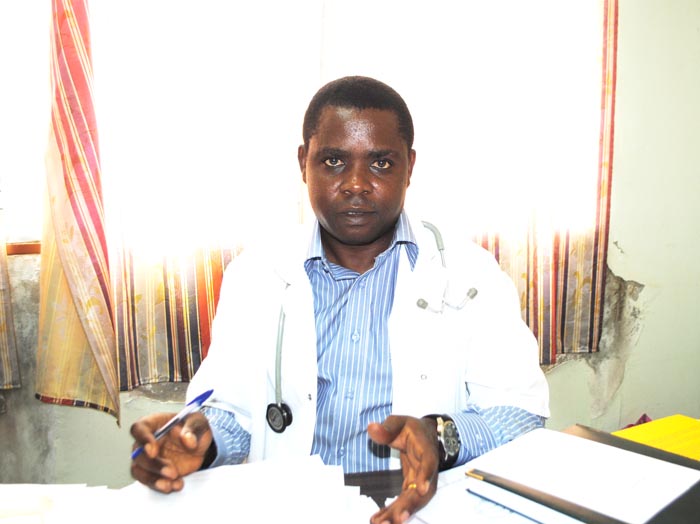In Burundi, renal insufficiency kills many people. So, people would like to know what it is, its causes and how to prevent it. IWACU has met a nephrologist for more details.–By Yves Didier Irakoze

Dr Joseph Nyandwi: “There exist two kinds of kidney failure: acute and chronic renal failure”.©Iwacu
“My dad died in 2011. He was suffering from malaria. But later on, he fell in coma and died. Then, we asked the doctor what happened; he said that the origin of the death was the kidney failure. But, we kept on asking many questions on kidney failure as it was not familiar to us. In fact, we didn’t know anything about it,” says Olivia Ndayininahaza. According to Joseph Nyandwi, Nephrologist at Kamenge University Hospital Center (CHUK), kidney failure is a loss of kidney functions which ensure blood the purification in order to eliminate toxic or uremic waste found in the blood; the elimination is done through urine. “There exist two kinds of kidney failure: acute and chronic renal failure. Acute renal failure is the brutal loss but reversible of the renal functions whereas all the structures of the kidney are normal, while chronic renal failure is the irreversible loss of renal function depending on impairment of kidney functional units: It means that the kidney structure has been damaged, there is no repairing. It’s a continual disease,” highlights Nyandwi. The causes of kidney failure which are pre-renal, intra-renal and post-renal may be combined into 2 main causes such as secondary kidney failure creating then a pathology that doesn’t stem from the kidney. About this case of pathologies which don’t start on the kidney, we can state diabetics, high blood pressure, bacterial or parasitic infections (malaria), excessive loss of water (diarrhea), excessive sweating during sunburn. “All those states, at the beginning, may result to acute renal failure once badly treated leading to chronic renal failure,” expresses Nyandwi.
Consequences are enormous
As far as the acute kidney failure is concerned, Nyandwi says that it is the potassium increase in blood with disturbance occurrence of heartbeat, cardiac arrest and sudden death. Concerning the chronic kidney failure, it has metabolic consequences that are accompanied with hyperkaelemia that can also cause sudden death.
Another consequence is on vessels. When there is a kidney insufficiency, there is a formation of phosphorous calcium that will go to the arteries. This may cause the increasing blood pressure. Nyandwi mentions that concerning the acute renal failure, it is recommended to restore what the patient has lost like water during diarrhea or vomit, and due to hemorrhage, the patient has to get back the blood. There is also a case where a patient needs a dialysis. “Only the dialysis and kidney transplant are the two main methods to treat chronic kidney failure,” Dr Nyandwi declares. It is worth informing that there are two kinds of dialysis; haemo and peritoneal dialysis. At CHUK, they have already started peritoneal dialysis. “It is a simple technique that can be carried out here in the country and in the near future, we will develop the dialysis for chronic renal failure,” he indicates.
Good attitudes must be adopted
As the main cause from acute kidney failure is the water loss and as we are in a tropical region where it is hot, then the first thing to do is to drink water from 1, 5 to 2 liter per 24h; it is better to bear in mind that alcoholic drink never replaces water. The second thing is to proceed to screening at least once per year. “People should also avoid self medication without a doctor’s prescription because some medicines may constitute the cause of installation of acute kidney failure especially non-steroidal anti-inflammatory medicines,” concludes Dr Nyandwi.
According to the statistics made at CHUK, the average age of people who suffer from acute kidney failure is around 45. The average of mortality to acute kidney failure due to obstetrical reasons is 45, 2%, probably because those patients are often in resuscitation situation. For secondary acute kidney failure due to malaria, the average of prevalence is 7, 2%, the mortality is 31, 2% and 80 % of the cases occur during 24h of hospitalization.














 IWACU Open Data
IWACU Open Data

